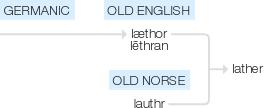Lather
Old English læthor (denoting washing soda or its froth), lēthran (verb), of Germanic origin; related to Old Norse lauthr (noun), from an Indo-European root shared by Greek loutron ‘bath’.
wiktionary
From Middle English lather, from Old English lēaþor(“a kind of niter used for soap, soda”), from Proto-Germanic *lauþrą(“that which is used for washing, soap”), from Proto-Indo-European *lówh₃trom(“that which is used for washing”), from *lewh₃-, *lowh₃-(“to wash, bathe”). Cognate with Swedish lödder(“lather, foam, froth, soap”), Icelandic löður(“foam, froth, a kind of niter used for soap”), Old Irish lóathar(“wash-basin”), Ancient Greek λουτρόν(loutrón, “a bath, wash-room”), Latin lavō(“I wash”), Albanian laj(“I wash”), Ancient Greek λούω(loúō). More at lye.
From Middle English *lethren, from Old English lēþrian, lȳþrian, *līeþrian(“to anoint, smear, lather”), from Old English lēaþor(“a kind of niter used for soap, soda”). See above.
etymonline
lather (n.)
Old English leaþr "foam, soap, washing soda," from Proto-Germanic *lauthran (source also of Old Norse lauðr "washing soap, foam"), from PIE *loutro- (source also of Gaulish lautron, Old Irish loathar "bathing tub," Greek louein "to bathe," Latin lavere "to wash"), which is from root *leue- "to wash" + instrumentative suffix *-tro-.
The modern noun might be a 16c. redevelopment from the verb. Meaning "violent perspiration" (especially of horses) is from 1650s; hence the transferred sense "state of agitation" (such as induces sweating), attested from 1839.
lather (v.)
from a Middle English variant of letheren (v.), from Old English leþran (late West Saxon lyþran) "become covered with (sweat, blood, etc.)," also transitive, from Proto-Germanic *lauthrjan (source also of Old Norse leyðra "to clean, wash;" see lather (n.)). Meaning "to form in froth, produce suds or foam" is from c. 1600. Related: Lathered; lathering.
